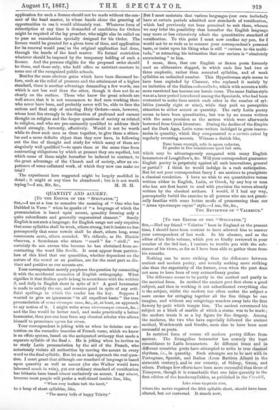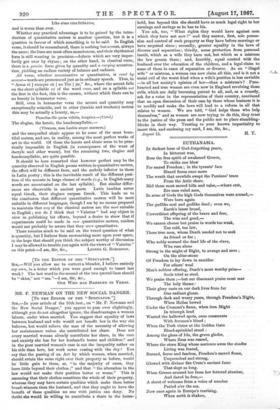[To THE EDITOR OF THE "SPECT4TOR.1 SIR,—Had my friend "
Valerius " been in England at the present time, I should have been content to have allowed him to answer your correspondent of last week. In his absence, and as the editor of his little volume, which you so kindly reviewed in your number of the 3rd inst., I venture to trouble you with the sub- stance of his views, so far as I have been able to gather them from his remarks.
Nothing can be more striking than the difference between ancient and modern poetry, and usually nothing more striking also than the superiority of the former, even when the poet does not seem to have been of very extraordinary genius.
The difference seems to be partly in the method and partly in the metrical form. In method the ancient poet first chose a good subject, and then in working it out subordinated everything else to the subject, whilst the modern too often makes the subject a mere excuse for stringing together all the fine things he can imagine, and without any misgivings wanders away into the first flowery by-path which tempts him. The ancient reverenced his subject as a block- of marble of which a statue was to be made ; the modern treats it as a lay figure for fine drapery. Among the moderns, the two who have especially followed the ancient method, Wordsworth and Goethe, seem also to have been most successful as poets.
In metrical form of course all modern poetry differs from ancient. The Evangeline hexameter has scarcely the least resemblance to Latin hexameters. At different times and in different countries poets have attempted to write ill true classical rhythms, i.e., in quantity. Such attempts are to be met with in Portuguese, Spanish, and Italian (Leon Battista Alberti in the sixteenth century), and in our country, of Sidney, Greet!, and others. Perhaps few efforts have been more successful than those of Tennyson, though it is remarkable that one false quantity in the first edition of the hendecasyllables, as published in the Cornlaill, Like same bsquIsite rose,
where the metre required the fifth syllable short, should have been altered, but not corrected. It stands now, Like some rare little rose, and is worse than ever.
Whether any practical advantage is to be gained by the intro- duction of quantitative metres is another question, but it is a question in favour of which something is to be said. In English verse, it should be remembered, there is nothing but accent, always the same; the lines are most often monotonous, and their rhythmical form is still wanting in precision—defects which are very imper- fectly got over by rhyme ; on the other hand, in classical verse, there is a precise form given by quantity and a varying accentua- tion, yielding an endless variety of balance and cadence.
All verse, whether accentuative or quantitative, is read by accent—words are pronounced just as in ordinary speech. Thus, in "Anna vi rumque c no Tro I jm," &c., where the accent falls on the short syllable cci of the word cano, and on a syllable not the first in the foot, this is the cassura, without which there can be no beauty in hexameter verse.
Still, even in hexameter verse the accent and quantity may exceptionally coincide, and in other (iambic and trochaic) metres this may be actually a beauty, as,— Phasdlus file quern videtis, h6spites.—(CcauL) The elegiac, the heroic, the hendecasyllabic,— (Vivamus, mea Lesbia atque amemus,) and the unequalled alcaic appear to be some of the most beau- tiful metres, and are, in reality, among the most perfect works of art in the world. Of these the heroic and alcaie seem to be prac- tically impossible in English (in consequence of the want of dactyls and other wants), but the remaining two, elegiac and hendecasyllabic, are quite possible.
It should be here remarked that however perfect may be the quantity observed in English poems written in quantitative metres, the effect will be different from, and the melody inferior to those in Latin poetry ; this is the inevitable result of the different posi- tion of the accents in large classes of words (e.g., in English many words are accentuated on the last syllable). But similar differ- ences are observable in ancient poets. Latin iambics never equal Greek, their elegiacs surpass Greek. This leads us to the conclusion that different quantitative metres will be most suitable in different languages, though I am by no means prepared to maintain that any of the classical metres are the most suitable to English ; nor do I think that " Valerius " had any object in view in publishing his efforts, beyond a desire to show that if experiments could be made in new quantitative metres, readers would not probably be aware that they were quantitative.
There remains much to be said on the vexed question of what is quantity, but I forbear from encroaching more upon your space, in the hope that should you think the subject worthy of discussion I may be allowed to trouble yon again with the views of " Valerius "































 Previous page
Previous page